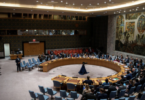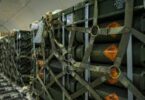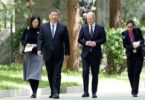WASHINGTON (Defensenews): The State Department has announced it reached a $13 million settlement with Honeywell, the U.S. defense firm, over allegations it exported technical drawings of parts for the F-35 fighter and other weapons platforms to China and other foreign countries.
Honeywell, of Charlotte, N.C., faced 34 charges involving drawings it shared with China, Taiwan, Canada and Ireland, according to the Bureau of Political-Military Affairs charging document. The State Department alleged some of the transmissions harmed national security, which Honeywell denies.
Altogether, the materials pertained to the F-35 joint strike fighter B-1B Lancer long-range strategic bomber; F-22 fighter; C-130 transport aircraft; A-7H Corsair; A-10 Warthog; Apache Longbow helicopter; M1A1 Abrams tank; Tactical Tomahawk Missile; the F/A-18 Hornet, and the F135, F414, T55 and CTS800 turboshaft engines.
The State Department said it would not debar Honeywell because it voluntarily disclosed its alleged violations of the the Arms Export Control Act and the International Traffic in Arms Regulations. Also, $5 million of the fine is suspended so Honeywell can apply it to compliance costs and remedial measures.
“Honeywell also acknowledged the serious nature of the alleged violations, cooperated with the Department’s review, and instituted a number of compliance program improvements during the course of the Department’s review,” the State Department said in a statement. “For these reasons, the Department has determined that it is not appropriate to administratively debar Honeywell at this time.”
Between 2011 to 2015, Honeywell allegedly used a file sharing platform to inappropriately transmit engineering prints showing layouts, dimensions, and geometries for manufacturing castings and finished parts for multiple aircraft, military electronics, and gas turbine engines. Its first disclosures of violations to the government came in 2015.
“The U.S. Government reviewed copies of the 71 drawings and determined that exports to and retransfers in the PRC of drawings for certain parts and components for the engine platforms for the F-35 Joint Strike Fighter, B-1B Lancer Long-Range Strategic Bomber, and the F-22 Fighter Aircraft harmed U.S. national security,” the charging document says.
Though Honeywell told the State Department in 2016 of corrective actions it had taken to prevent such violations from happening again, it disclosed further violations involving export-controlled drawings in 2018. Employees using “an alternative process” sent two drawings to Canada, two drawings to China and 23 drawings to Mexico.
“The U.S. Government reviewed copies of the 23 drawings and determined that exports to and retransfers in [China] of drawings for certain parts and components of the CTS800 gas turbine engine harmed U.S. national security,” the charging document says.
In a statement, Honeywell said it has since taken steps to ensure there are no repeat incidents, including adding personnel and training aimed at compliance.
“The issues Honeywell reported involved technology that was assessed as having no impact on national security and is commercially available throughout the world,” the company said. “No detailed manufacturing or engineering expertise was shared.”






